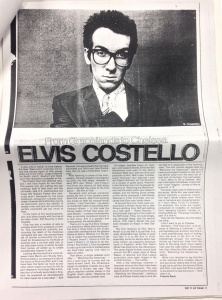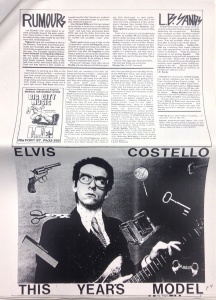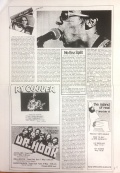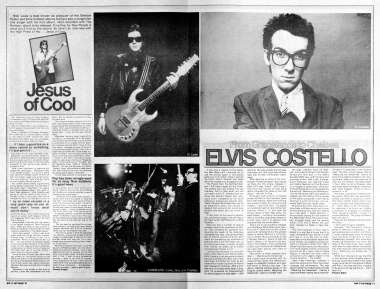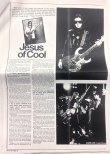|
It was only a matter of time before the Now Wave (and I promise not to use the phrase again in this piece) grew out of its initial, "today I learned my fourth chord" idealism and faced up to the necessity to progress or die.
The Pistols died, the Damned died, and I still have hopes for the Clash. The people who are making the real headway, both in their work, and the ultimately vital U.S. marketplace are those like Graham Parker who obviously aren't hampered by the same conscious antagonism towards technique. However admirable they may be as statements about the validity of session-man rock 'n' roll, out-of-tune guitars eventually get too much to bear
In the midst of this second generation, and allied closely with the rise of its major outlet, Stiff Records, is Elvis Costello.
Elvis has had a number of aids to success aside from questions of ability. The unlooked-for publicity surrounding the death of his illustrious namesake last year, the extraordinary set of stories surrounding his penchant for threatening his multitude of enemies with a six-inch steel nail, or his little black book, in which he kept their names, all added up to create considerable interest in him.
Looking like the result of a union between Hank Marvin and Woody Allen, Elvis Costello is not everyone's idea of the future of rock 'n' roll, and it may have been this factor as much as any other which made it so hard for him to gain release for his songs. After a fruitless tour of virtually every label in England, he answered an advertisement for demo tapes for a new label — Stiff Records. His was virtually the first tape submitted and Stiff boss Jake Riviera says that he was immediately impressed.
After listening to some of the competition. Riviera jumped in and signed up Elvis. His first single, released in early 1977, was "Alison," and it was a line from the chorus of that song which provided the name of his first album My Aim Is True.
Received with almost universal praise, My Aim Is True contains some bona fide classics. Apart from winning any prizes on offer for unusual lyrical content, "Less Than Zero," his attack on the British habit of canonising their national villains — in this case the former leader of their Nazi party, Oswald Mosely — contains more passion than is normally considered decent in a rock song. And it is passion that characterises the whole album.
That is not to say that Elvis indulges in a little Barry White after hours porn. Far from it. Every track on Aim is delivered with vehemence but the general theme is failure. Whether it is the failure to master the complexities of sex ("Mystery Dance"), failure to hold his lover ("Alison"), or failure to do anything ("Pay It Back"). Elvis is prepared to own up to the kinds of inadequacies we have been paying rock stars to deny for years.
That album, a single released soon after — "Watching the Detectives" — and a solid bout of touring with his newly-formed band, the Attractions, began to establish Costello as a sizable force in Britain last year. The album reached number eleven in the English charts while "Watching the Detectives" went to number nine.
On-stage, besides tours on their own, and support shows, Elvis and the Attractions took part in the Stiffs Greatest Stiffs tour, with Ian Dury and producer of Aim, Nick Lowe. A subsequent American tour featured Lowe and Martin Belmont (of the Rumour) on a couple of guest spots. Reaction to the American tour can be gauged by the entry of "Watching the Detectives" into the US charts within two weeks of release, and the Rolling Stone review of Aim which compared it with Randy Newman's Little Criminals and asserted that Elvis won hands down.
At around this time, there were ructions back in Britain which led to Jake Riviera splitting from Stiff and setting up a new label — Radar Records — and promptly signing to it the cream of the Stiff roster. Elvis, not surprisingly, was amongst these, and his second album, This Year's Model has just been released on Radar in New Zealand.
The first reaction to This Year's Model is to say that it is just that. It is really remarkable how similar in style and feel it is to My Aim Is True, especially since the earlier album features Clover, an ex-patriot American band in England, while This Year's Model has backing by the Attractions. The same slightly archaic sound built around the 60's organ style of Steve Mason, is retained, and Nick Lowe's production once again lingers in his normal territory — the middle.
After a few listenings, however, it becomes obvious that there have been changes and refinements. The new album (which for local buyers includes "Watching the Detectives," making a total of thirteen tracks) has a more varied feel to it, especially in the rhythms used. The odd, almost-reggae style of "Watching the Detectives" seems to have encouraged Costello to risk moving farther away from the basic set of rock 'n' roll stylings. The next single, "I Don't Want to Go to Chelsea" also has indefinable Caribbean overtones, and "Little Triggers" comes on as reluctant R 'n' B.
The other major area of difference is the words. While Aim was essentially, almost painfully a personal record, This Year's Model makes much more use of narrative and characterisation. In "I Don't Want To Go To Chelsea," for example, the lyrics are largely composed of snippets of dialogue from "swinging London" movies, including Blow-up. The song includes a gem of a line in:
They call her Natasha but she looks like Elsie,
I don't went to go to Chelsea.
Similarly, "This Year's Girl" is an attempt at defining a character — not just expressing an emotion, and this is a more sophisticated style of writing than the bulk of My Aim Is True. Interestingly enough, this technique throws up stand-out lines from the body of the song much more readily than was the case before. Everybody has their favourite little catch-phrase from "Watching the Detectives" it seems.
While I am reluctant to say that this is the ultimate Elvis Costello album, and you would need a bed of hot coals to get me to call him the future of rock 'n' roll, I am sure that Elvis is going to be around to see the future — whoever it is.
| 